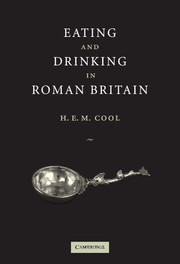Book contents
- Frontmatter
- Contents
- List of figures
- List of tables
- Preface
- Acknowledgements
- Chapter 1 Apéritif
- Chapter 2 The food itself
- Chapter 3 The packaging
- Chapter 4 The human remains
- Chapter 5 Written evidence
- Chapter 6 Kitchen and dining basics: techniques and utensils
- Chapter 7 The store cupboard
- Chapter 8 Staples
- Chapter 9 Meat
- Chapter 10 Dairy products
- Chapter 11 Poultry and eggs
- Chapter 12 Fish and shellfish
- Chapter 13 Game
- Chapter 14 Greengrocery
- Chapter 15 Drink
- Chapter 16 The end of independence
- Chapter 17 A brand-new province
- Chapter 18 Coming of age
- Chapter 19 A different world
- Chapter 20 Digestif
- Appendix: Data sources for tables
- References
- Index
Chapter 8 - Staples
Published online by Cambridge University Press: 22 September 2009
- Frontmatter
- Contents
- List of figures
- List of tables
- Preface
- Acknowledgements
- Chapter 1 Apéritif
- Chapter 2 The food itself
- Chapter 3 The packaging
- Chapter 4 The human remains
- Chapter 5 Written evidence
- Chapter 6 Kitchen and dining basics: techniques and utensils
- Chapter 7 The store cupboard
- Chapter 8 Staples
- Chapter 9 Meat
- Chapter 10 Dairy products
- Chapter 11 Poultry and eggs
- Chapter 12 Fish and shellfish
- Chapter 13 Game
- Chapter 14 Greengrocery
- Chapter 15 Drink
- Chapter 16 The end of independence
- Chapter 17 A brand-new province
- Chapter 18 Coming of age
- Chapter 19 A different world
- Chapter 20 Digestif
- Appendix: Data sources for tables
- References
- Index
Summary
INTRODUCTION
A staple food may be defined as something that forms the most important part, or a principal part, of the diet. Judged by the literary sources, cereal foods performed this role in antiquity. Cato specifies the quantity of wheat and bread suitable for a household, and relegates all other foodstuffs to the role of relishes. Vegetius, writing about supplying the army in the field, lists grain together with wine and salt, as the provisions whose shortages should be prevented at all times. Considering the quantities of quernstones found, and the evidence of the charred grain deposits, it seems very likely that the inhabitants of Roman Britain viewed foods derived from grain in a similar way. This chapter explores what those foods might have been, and how they were prepared. It also attempts to explore how the consumption of different grains might have been regarded, as within the Roman world there was a hierarchy of esteem relating to this.
THE GRAINS THEMSELVES
Three different types of wheat are found in the charred grain assemblages of Roman Britain – emmer (Triticium diococcum), spelt (Triticium spelta) and bread wheat (Triticium aestivum). Emmer had been grown in Britain since the Neolithic period. Spelt appears to have been an introduction of the first millennium BC, and was well established by the late Iron Age. Bread wheat, which is less disease resistant, occurs sporadically from the Neolithic period onwards, but it is not until the post-Roman period that it appears to have become a popular crop.
- Type
- Chapter
- Information
- Eating and Drinking in Roman Britain , pp. 69 - 79Publisher: Cambridge University PressPrint publication year: 2006



